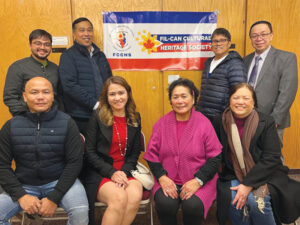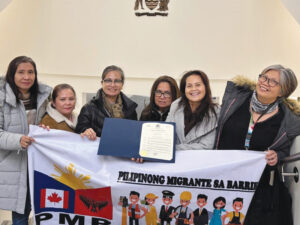From helping raise children to attending to the elderly and ministering to people with medical needs, caregivers play a vital part in supporting families in Canada.
However, often overlooked is one important question: who’s looking after caregivers?
As a former caregiver, Lina Vargas knows the value of being able to access a range of services in a safe and comforting environment.
This is the reason why the Vancouver woman welcomed the role of coordinator in a pioneering program that aims to provide various services to caregivers as well as their families.
Called Kusina, which is Filipino word for ‘kitchen’, the initiative is built around sharing a meal with fellow caregivers, while experts and resource persons sort out their concerns, ranging from settlement to mental health and legal issues.
“Based on my personal experience and what I have witnessed, caregivers are vulnerable to isolation and exploitation. Because of their precarious situation, they need bridges to connect with individuals and institutions for help,” Vargas says.
“This is what Kusina is all about: it’s building connections, creating networks, developing solidarity, and breaking down barriers,” Vargas explains.
By providing caregivers access to services and resources, Kusina also aims to educate and empower them to fight for and assert their rights.
Kusina is a collaboration between Filipino BC and the Collingwood Neighbourhood House in Vancouver.
The program launches in the wake of concerns expressed by Tomoya Obokata, a special rapporteur with the UN, about the situation of foreign workers in Canada.
The UN representative visited Vancouver, Montreal, Toronto, Moncton and Ottawa between August 23 and September 6, 2023.
In his end-of-mission statement, Obokata reported that he is “disturbed by the fact that certain categories of migrant workers are made vulnerable to contemporary forms of slavery in Canada”.
“The Government of Canada has been made aware of the potential for abuse and exploitation and the lack of effective oversight of temporary foreign worker programmes on multiple instances over the past decade, including through reports from the Auditor General and relevant Parliamentary Committees,” Obokata stated.
On October 15, Kusina organizers hosted a legal information session for caregivers at the Collingwood Neighbourhood House (5288 Joyce Street).
The session was delivered by lawyer Karen Bation of the Justice Centre at the Battered Women’s Support Services (BWSS).
BWSS executive director Angela Marie MacDougall says, “Alleviating isolation and building relationships to advance justice is at the heart of this collaboration between Kusina, Collingwood Neighbourhood House, and the Justice Centre at BWSS.”
“It will take community-based interventions like this to bring reform,” MacDougall also says.
Caregiving has been historically imposed on women. Moreover, this system has greatly impacted women who come from developing countries like the Philippines to work as caregivers in Canada and other rich nations.
Rafael ‘RJ’ Aquino is the chairperson of Filipino BC, a nonprofit dedicated to developing social-service programs that respond to needs by various communities in culturally-informed ways.
“Systemic gaps persist in how our community is underserved by existing social services. We cannot stand idly by and not provide community and support to care workers that are always under threat of exploitation and abuse,” Aquino says.
The Filipino BC leader adds about Kusina, “A program like this that is led by former caregivers for current caregivers gives access to hope, solidarity, and tangible services that will directly benefit those care workers made vulnerable by their current situation.”
The Collingwood Neighbourhood House offers a variety of programs and services as part of its mission to improve the well-being of the Renfrew-Collingwood community in East Vancouver.
Samuel Cervantes, vice president of the board of Collingwood Neighbourhood House, says that the social service agency aims to “build community as a place to belong, a place to grow”.
“We appreciate the opportunity to partner with Filipino BC on a program that helps connect and take care of those that are sacrificing so much to take care of us,” Cervantes states.
“Our neighbourhood is one of the largest and most diverse in Vancouver, with a high proportion of immigrants and non-native English speakers, including a strong representation from the Filipino community,” Cervantes adds.
The next Kusina gatherings happen on October 29, November 12, November 26, and December 10 from 4 p.m. to 7 p.m. at Collingwood Neighborhood House (5288 Joyce Street, Vancouver).







